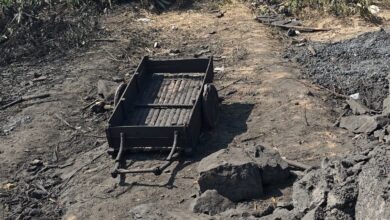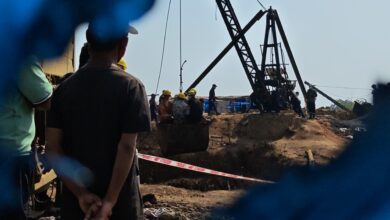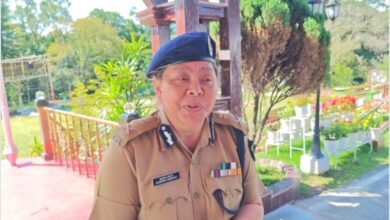Fighting drug menace
Govt is ready with an action plan as drug abuse rises alarmingly in Meghalaya

For Mike (name changed), who is in his late teens, substance abuse started as a fun trip with friends and he got addicted to heroin even before he knew. Like Mike, thousands of youths in the North East, including Meghalaya, are addicted to one or more psychotropic substances and the rising numbers are a cause for concern.
The gravity of the situation in the North East can be understood from a detailed study conducted by the United Nations Drug Control Programme (UNDCP) in 2018 that described the situation as “fast going beyond one’s control”. The report had also exposed deep-rooted nexus between drug mafia and politicians. “Border states like Arunachal Pradesh have as high as 75% of their population under the grip of drug abuse,” another research had stated.
On June 26, Manipur Chief Minister N. Biren Singh disposed of drugs worth Rs 205 crore by burning it in Bishnupur district. The burnt items included around 3,000 kg of ganja, 14 kg of heroin, 20 kg of crystal methamphetamine, 104 kg of WY tablets and 3,482 kg of SP tablets.
In Meghalaya, the number of drug users stands at 2.5 lakh. This would mean that a large section of the young population is losing the prime period, which in turn would have economic and social repercussions.
The percentage of opioid user is the highest at 6.34% followed by cannabis at 1.68%. Shillong, Tura, Jowai and Baghmara have been identified as hotspots of drug abuse, a report by the Office of IGP: CID shows.
 While the Meghalaya government came up with a policy on drug abuse in 2020, it released a comprehensive action plan this year to reduce drug addiction among youths. According to a study — Assessment of pattern, profile and correlate of substance use among children in India — conducted by the National Commission for Protection of Child Rights and AIIMS, “illicit drug use is increasing in Meghalaya, making it one of the highest substance (tobacco and heroin) user amongst children in the country”.
While the Meghalaya government came up with a policy on drug abuse in 2020, it released a comprehensive action plan this year to reduce drug addiction among youths. According to a study — Assessment of pattern, profile and correlate of substance use among children in India — conducted by the National Commission for Protection of Child Rights and AIIMS, “illicit drug use is increasing in Meghalaya, making it one of the highest substance (tobacco and heroin) user amongst children in the country”.
The action plan has two broad parts — primary and secondary preventions. Under the former, the government plans to leverage the ongoing awareness programmes at village, block and district levels. It also plans to identify a nodal officer for monitoring the developments and set up more deaddiction centres in collaboration with NGOs. A strict surveillance around educational institutes is also on the list of action being planned.
Under secondary preventions, the government plans to focus on counselling centres at various levels like Community Peer led Intervention (CPLI) for early drug use prevention among adolescents, outreach and drop-in centres, linking counselling with vocational centres, diagnostic centres, hospitals, drug treatment centres, and networks of people using drugs as well as those living with HIV. More detoxification camps and harm reduction centres (promoting needle syringe exchange programme and opioid substitution therapy among injected drug users) will be developed to check spread of drug use among youngsters.
The government has set up harm reductions and opioid substitution therapy centres in East Khasi Hills, East Jaintia Hills and West Jaintia Hills. Currently, there are seven such opioid substitution therapy centres in the state, and satellite centres will be set up in Civil Hospitals of Nongpoh and Nongstoin. The centres are expected by September of this year.
The 360-degree action plan also includes after care and counselling of rehabilitating and reformed drug users. Also, much emphasis is being put on strengthening drug supply reduction strategy and fast-tracking cases under the NDPS Act.
“The government intends to wage an all-out war on the menace of drug abuse in collaboration with all the stakeholders involved. Stringent punishment will be meted out to drug smugglers/peddlers/traders. It is high time to take effective and resolute steps to stop the availability of these drugs in the state through vigil on the borders, in joint operations by the State Police, BSF, and Custom and Narcotics Control Departments and agencies,” Chief Minister Conrad Sangma said during a programme on the occasion of International Day Against Drug Abuse and Illicit Trafficking.
The government will create a corpus fund to ensure that procedural delays are avoided in the immediate launch of the campaign and implementation of related schemes.
Drug abuse not only affects individual lives but also leads to healthcare and law and order crises. Use of injectable drugs makes one vulnerable to HIV/AIDS and has other debilitating impact on health. This not only puts burden on families but also on the healthcare system. Addiction also leads to financial constraints which often force youngsters into petty crime and sex trade.
The state government has a daunting task of implementing its schemes and programmes sincerely and ensure that all departments concerned work in tandem to control both drug abuse and trafficking.
~ Team Sunday Monitor





